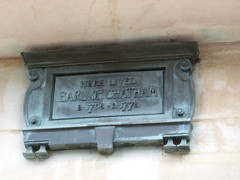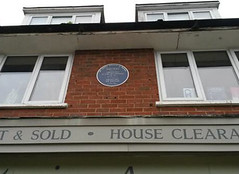

Rt Hon. Earl William Pitt PC FRS
(1708-1778)
Pitt the Elder, the Great Commoner, Fellow of the Royal Society, Member of Parliament (1735-1747), Privy Counsellor (from 1746), Member of Parliament (1747-1754), Member of Parliament (1754-1756), Member of Parliament (1756), Member of Parliament (1756-1757), Member of Parliament (1757-1766), 1st Earl of Chatham (from 1766), Lord Privy Seal (1766-1768), 1st Viscount Pitt (1766-1778), and 10th Prime Minister of the United Kingdom (1766-1768)
Died aged c. 70
Wikidata WikipediaWilliam Pitt, 1st Earl of Chatham, PC, FRS (15 November 1708 – 11 May 1778) was a British statesman of the Whig group who served as Prime Minister of Great Britain from 1766 to 1768. Historians call him Chatham or William Pitt the Elder to distinguish him from his son William Pitt the Younger, who was also a prime minister. Pitt was also known as the Great Commoner, because of his long-standing refusal to accept a title until 1766. Pitt was a member of the British cabinet and its informal leader from 1756 to 1761 (with a brief interlude in 1757), during the Seven Years' War (including the French and Indian War in the American colonies). He again led the ministry, holding the official title of Lord Privy Seal, between 1766 and 1768. Much of his power came from his brilliant oratory. He was out of power for most of his career and became well known for his attacks on the government, such as those on Walpole's corruption in the 1730s, Hanoverian subsidies in the 1740s, peace with France in the 1760s, and the uncompromising policy towards the American colonies in the 1770s. Pitt is best known as the wartime political leader of Britain in the Seven Years' War, especially for his single-minded devotion to victory over France, a victory which ultimately solidified Britain's dominance over world affairs. He is also known for his popular appeal, his opposition to corruption in government, his support for the American position in the run-up to the American Revolutionary War, his advocacy of British greatness, expansionism and empire, and his antagonism towards Britain's chief enemies and rivals for colonial power, Spain and France. Marie Peters argues his statesmanship was based on a clear, consistent, and distinct appreciation of the value of the Empire. The British parliamentary historian P. D. G. Thomas argued that Pitt's power was based not on his family connections but on the extraordinary parliamentary skills by which he dominated the House of Commons. He displayed a commanding manner, brilliant rhetoric, and sharp debating skills that cleverly utilised broad literary and historical knowledge. Scholars rank him highly among all British prime ministers.
DbPedia
Family tree
Commemorated on 9 plaques
Here lived three Prime Ministers: William Pitt Earl of Chatham 1708-1778 Edward Geoffrey Stanley Earl of Derby 1799-1869 William Ewart Gladstone 1809-1898
Chatham House, 10 St James's Square, Westminster, SW1, London, United Kingdom where they lived
William Pitt 1st Earl Of Chatham 1708 – 1778 Lived at South Lodge near this Site prior to 1754
44 Merryhills Drive N2, London, United Kingdom where they lived near
William Pitt 1708-1778, First Earl of Chatham, known as Pitt the Elder and the Great Commoner, MP for Old Sarum 1735-47, Prime Minister 1766-68, spent part of his boyhood here.
Marwarden Court, Salisbury, United Kingdom where they acquired
Behind these premises stood Hayes Place the home of William Pitt 1st Earl of Chatham 1708-1778 British Prime Minister and the birthplace of William Pitt the Younger 1759-1806 British Prime Minister
25 Hayes Street, Hayes, Bromley, BR2 7LE, London, United Kingdom where they was
This house occupies part of the site of what was originally known as the Great House of Lyme Regis. Here lodged in the summer of 1773 William Pitt (1708-1778), first Earl of Chatham, the great War Minister of George II, and his son William Pitt (1759-1806), the great Prime Minister of George III. Also for some months in 1796-1797 it was the home of Mary Russell Mitford (1787-1855) essayist & dramatist
Boots, 45 Broad Street, Lyme Regis, United Kingdom where they stayed (1773)
William Pitt Earl of Chatham 1708-1778 Prime Minister lived in a house on this site
Terrace House, North End Avenue, London, United Kingdom where they lived
THE WHITE HART HOTEL This grade II listed building is the town's oldest inn. The White Hart was "given it's official licence as Okehampton's leading inn at the new Quarter Sessions when the town's charter was granted in 1623". Originally a 17th century coaching inn, on what was the Old London Road, the White Hart takes its name from the emblem of King Richard II. Many important events were held here. William Pitt the Elder was a frequent visitor. MP for the Borough of Okehampton, in the 1750's, Pitt later held office as Prime Minister. These premises were refurbished by JD Wetherspoon and opened in July 2016
Fore Street, Okehampton, United Kingdom where they visited
Pitt House. William Pitt (The Elder) 1st Earl of Chatham 1708-1778 Seaford MP Prime Minister stayed here
Saxon Lane, Seaford, United Kingdom where they stayed





.jpg?width=250)

